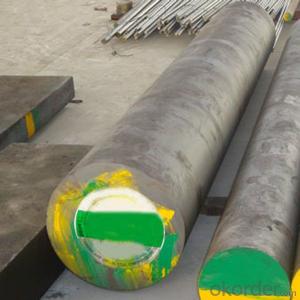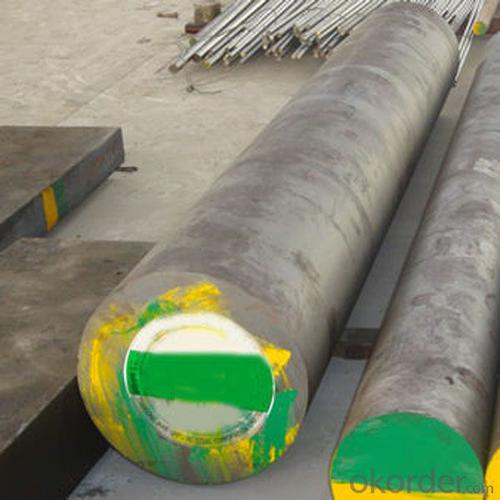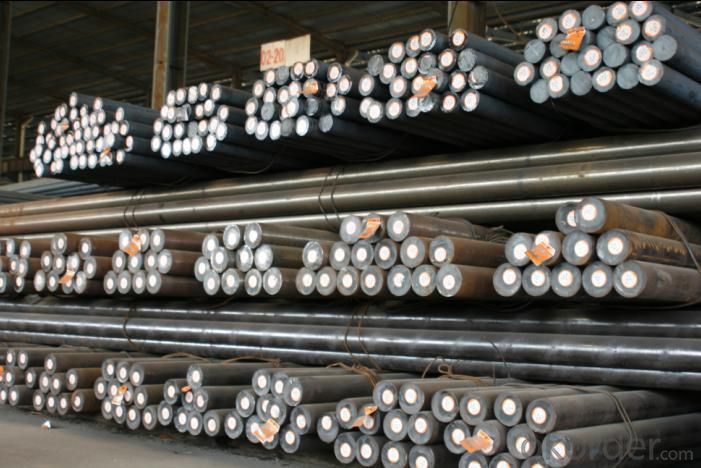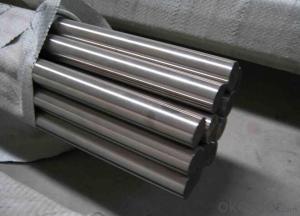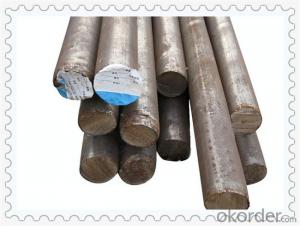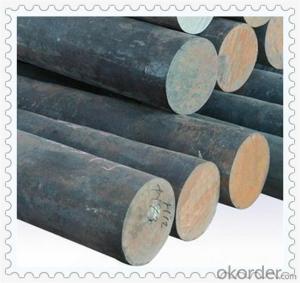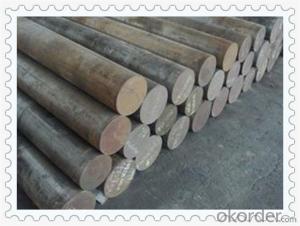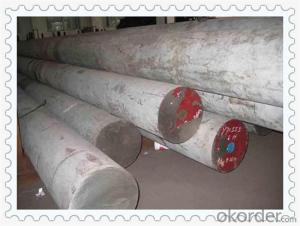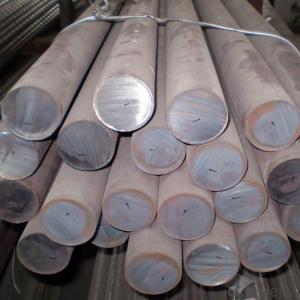SCM440 42CrMo4 Alloy Structural Steel Round Bar
- Loading Port:
- China main port
- Payment Terms:
- TT OR LC
- Min Order Qty:
- 30 m.t.
- Supply Capability:
- 10000 m.t./month
OKorder Service Pledge
OKorder Financial Service
You Might Also Like
Specification
SCM440 42CrMo4 Alloy Structural Steel Round Bar
Product Information:
Diameter:10mm-700mm
Length:3000mm-12000mm Straightness: 3mm/M max
Process:EAF + LF + VD + Forged + Heat Treatment (optional)
Delivery condition:Hot forged +Rough machined (black surface after Q/T)+ Turned (optional)
Delivery Time:30-45 days
MOQ:30at treatment:
Normalized / Annealed / Quenched / tempered
Technical Data:According to the customer's requirement of Chemical Composition, Physical Properties and Mechanical Testing
Test:Ultrasonic test according to SEP 1921-84 G3 C/c
Marking:Grade, heat NO. length will be stamped one each bar with required color
Payment:30% advance by T\T, the balance against B/L
Application:Statically and dynamically stressed components for vehicles, engines and machines. For parts of larger cross-sections, crankshafts, gears.
Product Overviews:
| Product Name | Typical Grades | Diameter(mm) | Standard adopted |
| Carbon Steel | 20 (1020/S20C/C22) | Ø16-Ø300 | GB/SAE/JIS/DIN |
| 40 (1040/S40C/C40) | |||
| 45 (1045/S45C/C45) | |||
| Bearing Steel | GCr9 (51100/SUJ1) | Ø12-Ø250 | |
| GCr15 (52100/SUJ2/100Gr6) | |||
| GCr9SiMn (A485-Gr.1/SUJ3) | |||
| Cr-Mo Steel | 20Cr (5120/SCr420H/20Cr4) | Ø12-Ø250 | |
| 40Cr (5140/SCr440/41Cr4) | |||
| 42CrMo(4140/SCM440/42CrMo4) | |||
| Gear Steel | 20CrNiMo | Ø16-Ø600 | |
| 20CrMn(5115/SMnC420/20MnCr5) | |||
| 20CrNiMo(8620/SNCM220/20CrMiMo2) |
Product Show:

Our Advantages:
· Industry experience over 20 years.
· Shipment of goods -More than 70 countries worldwide.
· The most convenient transport and prompt delivery.
· Competitive price with best service.
· High technical production line with top quality products.
· High reputation based on best quality products.
With our experienced, enthusiastic and dynamic staffs, we assure to bring you the products with best quality, reasonable prices and good after-sales services under the motto: Friends First, Business After.
Communication, Experience, Expertise and Best efforts are our Promises to you.
- Q: How is precipitation-hardening steel used in aerospace applications?
- Precipitation-hardening steel is commonly used in aerospace applications due to its exceptional strength-to-weight ratio and excellent corrosion resistance. It is extensively used in critical components such as aircraft structural parts, landing gear, engine components, and fasteners. The precipitation hardening process involves heating and cooling the steel to create a fine dispersion of precipitates, which significantly enhances its mechanical properties. This steel's high strength allows for the construction of lighter and more fuel-efficient aircraft, while its corrosion resistance prolongs the lifespan of aerospace components, ensuring safe and reliable operation.
- Q: What are the main applications of special steel in the power storage industry?
- Special steel is widely used in the power storage industry for various applications. One of the main uses is in the manufacturing of battery components, such as battery casings, terminals, and connectors, due to its excellent corrosion resistance and high strength. Special steel is also utilized in the production of power transmission and distribution equipment, including transformers, generators, and turbines, where its superior mechanical properties and durability ensure reliable and efficient power generation and transmission. Additionally, special steel is employed in the construction of power storage structures, such as tanks and containers, providing long-lasting protection against environmental factors and maintaining the integrity of stored energy.
- Q: How does high-speed steel perform in high-temperature cutting operations?
- High-speed steel performs well in high-temperature cutting operations due to its exceptional heat resistance and ability to retain hardness at elevated temperatures. This enables it to maintain its cutting efficiency, withstand thermal stress, and resist deformation, resulting in improved tool life and productivity.
- Q: What are the different methods of surface hardening for special steel?
- Special steel can be surface hardened using various methods. These methods comprise: 1. Carburizing: By subjecting the steel to a carbon-rich environment, such as gas or liquid, carbon atoms can infiltrate the steel surface. This results in enhanced surface hardness and wear resistance. 2. Nitriding: Steel is heated in an environment rich in nitrogen, causing nitrogen atoms to permeate the surface. This creates a durable, wear-resistant outer layer. 3. Induction hardening: By passing an alternating current through a coil, a magnetic field is generated, inducing electrical currents in the steel. The resistance to these currents generates heat, leading to high surface temperatures and rapid quenching, ultimately increasing hardness. 4. Flame hardening: The steel surface is heated using a flame or oxy-fuel torch, followed by quenching in water or oil. The swift cooling from elevated temperatures facilitates surface hardening. 5. Laser hardening: Laser beams are employed to rapidly heat a specific area of the steel surface, which is then promptly cooled with a coolant. This localized heating and cooling process enhances the hardness of the treated region. 6. Plasma nitriding: Steel is placed in a low-pressure plasma chamber, where nitrogen ions bombard the surface, facilitating nitrogen diffusion and the formation of a hardened layer. Each method offers distinct advantages and is suitable for diverse applications and types of special steel. The selection of a surface hardening method depends on factors such as desired hardness, dimensional limitations, and specific application requirements.
- Q: What are the environmental impacts of using special steel?
- The environmental impacts of using special steel can vary depending on factors such as the production process, sourcing of raw materials, and waste management practices. However, some common environmental impacts associated with special steel production include carbon dioxide emissions, energy consumption, water pollution, and habitat destruction. Special steel often requires high energy inputs and releases significant amounts of greenhouse gases during production, contributing to climate change. Additionally, the extraction and processing of raw materials used in special steel production can lead to water pollution and habitat degradation if not managed properly. It is important for industries to adopt sustainable practices and technologies to minimize these environmental impacts and promote a more sustainable use of special steel.
- Q: What are the main applications of special steel?
- Special steel has a wide range of applications in various industries such as automotive, aerospace, construction, energy, and manufacturing. It is commonly used for the production of high-performance components, tools, and machinery parts that require exceptional strength, durability, and resistance to corrosion and heat. Additionally, special steel is utilized in the production of surgical instruments, cutlery, and various consumer goods that require high-quality materials to ensure reliability and longevity.
- Q: What are the different renewable energy grades of special steel?
- There are different grades of special steel used in the production of renewable energy equipment, such as wind turbines, solar panels, and hydroelectric generators. These grades include high-strength steel, corrosion-resistant steel, and heat-resistant steel. Each grade is specifically designed to withstand the unique operating conditions and environmental factors associated with renewable energy applications.
- Q: Can special steel be used in the medical field?
- Yes, special steel can be used in the medical field. Special steel alloys, such as stainless steel, are widely used in medical and surgical instruments, implants, and equipment. Stainless steel is chosen for its excellent corrosion resistance, strength, and durability. It is often used for surgical instruments like scalpels, forceps, and needles, as well as for orthopedic implants like bone screws and plates. Additionally, special steel alloys are used in the construction of medical equipment like MRI machines and X-ray tables, where high strength and magnetic properties are required. Overall, special steel is an essential material in the medical field due to its unique properties and ability to meet the stringent requirements for hygiene, safety, and reliability.
- Q: How does special steel resist fatigue?
- The durability and strength of special steel are enhanced through the incorporation of specific properties that resist fatigue. The high tensile strength of this steel is a primary factor in its ability to withstand stress and load without deforming or breaking, preventing the initiation and spread of fatigue cracks. In addition, special steel often undergoes heat treatment processes like quenching and tempering to further enhance its fatigue resistance. This alters the steel's microstructure, creating a fine and uniform grain structure that improves its mechanical properties. It increases hardness and toughness, reducing susceptibility to fatigue failure. Furthermore, special steel can be alloyed with elements like chromium, molybdenum, and vanadium to enhance its resistance to fatigue. These elements form carbides and other strengthening phases within the steel, improving hardness, strength, and resistance to fatigue crack propagation. Moreover, specialized surface treatments like shot peening and nitriding can be applied to special steel. Shot peening involves bombarding the steel surface with small metal particles, inducing compressive residual stresses. These stresses counteract the tensile stresses that cause fatigue cracks, thus enhancing fatigue resistance. Nitriding involves diffusing nitrogen into the steel surface, creating a hardened layer that improves wear resistance and, consequently, fatigue resistance. In conclusion, special steel resists fatigue through a combination of factors, including high tensile strength, specific heat treatment processes, alloying elements, and specialized surface treatments. These properties work together to enhance the steel's durability, strength, and resistance to fatigue crack initiation and propagation, making it a reliable and long-lasting material for various applications.
- Q: How is special steel used in the production of aircraft components?
- Special steel is used in the production of aircraft components due to its exceptional strength, durability, and resistance to corrosion. It is commonly utilized in critical areas such as engine components, landing gear, and structural parts where high performance and reliability are essential. The special properties of steel allow for the creation of lightweight yet strong components, ensuring the safety and efficiency of aircraft operations.
Send your message to us
SCM440 42CrMo4 Alloy Structural Steel Round Bar
- Loading Port:
- China main port
- Payment Terms:
- TT OR LC
- Min Order Qty:
- 30 m.t.
- Supply Capability:
- 10000 m.t./month
OKorder Service Pledge
OKorder Financial Service
Similar products
Hot products
Hot Searches
Related keywords
